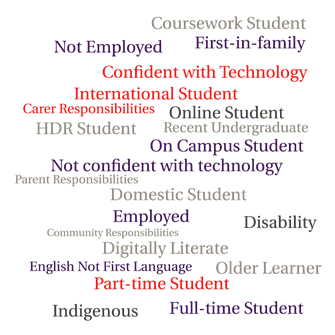No two postgraduate student experiences are alike, with diversity, as opposed to consistency, acting as the norm within the postgraduate student population (Eckersley et al, 2016, p5)
No two postgraduate student experiences are alike, with diversity, as opposed to consistency, acting as the norm within the postgraduate student population (Eckersley et al, 2016, p5)
Postgraduate students differ across multiple dimensions.

“Diversity refers to implicit and explicit understanding that each student is unique. It is the notion that all postgraduate students have individual learning preferences, backgrounds, needs, and capacities, which need to be respected and valued to provide excellence and equity in higher education” (Morgan, 2013, cited in Eckersley et al, 2016, p 7).
Diversity in the postgraduate cohort brings unique challenges which need to be understood and addressed when designing and delivering learning and teaching in order to improve learning and employability outcomes for postgraduate students (Eckersley et al, 2016).
Biggs and Tang (2011) also suggested educators consider the ‘diversity in motivation’ amongst their student cohorts. By this they suggest that some students enrolled in a unit may be intrinsically-motivated and others may be extrinsically-motivated. At ACU educators at the postgraduate level have reported that not all students demonstrate being intrinsically motivated – they may be doing their course because their employer is paying or requires it, or they need a postgraduate qualification in order to access promotion opportunities.
These differences in motivation may potentially impact a student’s engagement with their studies; when designing and delivering learning and teaching, consideration needs to be given to the diversity of student motivation for studying.
ALTC Kift Senior Fellowship. (n.d.). First year curriculum principles: Briefing for institutional learning and teaching leaders [PDF]. Retrieved December 2017 from http://transitionpedagogy.com/reports-and-resources/principles-checklists/
ALTC Kift Senior Fellowship. (n.d.). First year curriculum principles: Program coordinator checklist [PDF]. Retrieved December 2017 from http://transitionpedagogy.com/reports-and-resources/principles-checklists/
ALTC Kift Senior Fellowship. (n.d.). First year curriculum principles: First year teacher [PDF]. Retrieved December 2017 from http://transitionpedagogy.com/reports-and-resources/principles-checklists/
Biggs, John B., and Catherine Tang. Teaching For Quality Learning At University, McGraw-Hill Education, 2011. ProQuest Ebook Central, https://ebookcentral.proquest.com/lib/acu/detail.action?docID=798265.
Eckersley, B., Crane, L., Kinash, S., Bannatyne, A., Hamlin, G., Partridge, H., Richardson, S., Rolf, H., & Udas, K. (2016). National research on the postgraduate student experience: Case presentation on postgraduate student diversity (Volume 2 of 3). Canberra, ACT: Australian Department of Education and Training. Retrieved from: http://PostgraduateStudentExperience.com
Please contact the Learning and Teaching Centre for professional development, resources and advice for your learning and teaching needs at ACU.
Canvas provides a free, 24/7 live chat and support number for all technical queries